Discover the culinary magic that happens when fresh salmon meets vibrant citrus flavors. Whether you’re a seafood enthusiast or a home cooking pro, the combination of salmon and citrus is a match made in foodie heaven. From the tangy zing of lemon to the sweet zest of orange, citrus fruits have a unique ability to elevate salmon dishes to new heights of flavor. But why exactly does this partnership work so well? And which citrus fruits truly complement salmon perfectly? In this article, we’ll dive into the art of pairing salmon with citrus, explore the best ways to prepare it, and uncover the secrets behind creating a citrus-glazed salmon that’s simply unforgettable. We’ll also discover how arugula can transform your salmon dish into a nutrient-packed powerhouse. So, grab your apron, and let’s embark on a journey to master the perfect salmon and citrus combination!

What Citrus Goes Well with Salmon?
Salmon pairs beautifully with a variety of citrus fruits, each bringing a unique flavor profile that complements its rich, fatty texture. Here are some excellent citrus options:
- Lemon : Known for its bright acidity, lemon is a classic choice. Lemon juice or zest adds a refreshing tang, balancing the salmon’s richness.
- Orange : Sweet and tangy, orange works well in both juices and zests. It provides a vibrant contrast to the fish’s flavor.
- Lime : Lime’s zesty freshness is perfect for a lighter, citrusy touch. Commonly used in marinades or as a finishing squeeze.
- Grapefruit : With its slightly sweeter taste, grapefruit adds a unique twist. Its bitterness pairs well with salmon’s richness.
- Yuzu : A Japanese citrus fruit with a tangy, slightly fruity flavor, yuzu is great in marinades or dressings for a Japanese-inspired dish.
- Blood Orange : Known for its deep red hue and bold flavor, blood orange adds a luxurious touch, especially when used as a drizzle or relish.
- Lemon Zest and Orange Zest : These are often used as garnishes, providing a crunchy texture and aromatic notes without overwhelming the dish.
Citrus fruits not only enhance the taste of salmon but also contribute nutritional benefits, particularly vitamin C, which supports the body’s absorption of omega-3 fatty acids found in salmon.
How to Cook Salmon with Citrus
To cook salmon with citrus, follow these simple steps for a flavorful and easy meal:
- Preparation: Preheat your oven to 375°F (190°C). Season the salmon fillets with salt, pepper, and a pinch of thyme, rosemary, oregano, or marjoram. Place the salmon in a shallow baking dish.
- Add Citrus: Arrange thin slices of lemon and orange on top of the salmon. Drizzle with olive oil and bake for 25-35 minutes, or until the edges of the salmon begin to turn opaque and are nearly cooked through.
- Resting: Allow the salmon to rest for 5-10 minutes after baking. Cover lightly with foil to keep it warm while preparing your sides.
Citrus Herb Salmon Recipe
For a fresh and zesty twist, try this citrus-infused salmon recipe:
- Ingredients: – 4-6 oz salmon fillets – Salt and pepper to taste – Lemon and orange slices – Olive oil – Fresh thyme, rosemary, oregano, or marjoram
- Instructions:
- Preheat oven to 375°F (190°C). Season salmon with salt, pepper, and herbs.
- Arrange lemon and orange slices on a baking sheet or dish. Place salmon on top of the slices.
- Drizzle with olive oil and bake for 25-35 minutes.
- Let rest for 5-10 minutes before serving.
Serving Suggestions
Pair your citrus salmon with:
- Crisp white wine or a refreshing beer
- Garlic bread or crusty baguette
- Quinoa or brown rice
- A simple green salad
Citrus-Sesame Salmon Alternative
For a variation, try this alternative method:
- Ingredients: – 4-6 oz salmon fillets – 2 tbsp sesame oil – 1 tbsp honey (or agave for a sugar-free option) – 1 tsp soy sauce – 1/4 cup orange juice – 1/4 cup lemon juice – 1 tsp ginger, minced – 1 clove garlic, minced – Red chili flakes (optional) – Sesame seeds (garnish)
- Instructions:
- Preheat oven to 375°F (190°C). Season salmon with salt and pepper.
- In a baking dish, combine sesame oil, honey, soy sauce, orange juice, lemon juice, ginger, garlic, and chili flakes (if using).
- Place salmon in the dish, coat with the mixture, and bake for 25-30 minutes.
- Garnish with sesame seeds and serve hot.
Enjoy your perfectly cooked salmon with the zesty flavors of citrus!
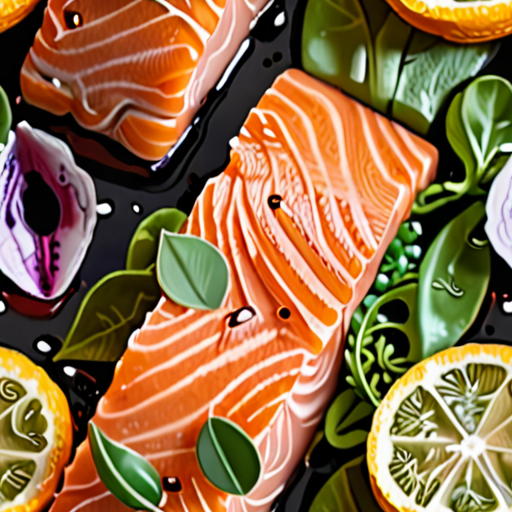
Best Fruits to Pair with Salmon
Salmon, known for its rich flavor and healthy omega-3 fatty acids, pairs exceptionally well with certain fruits that complement its taste and enhance the overall dining experience. Here’s a curated list of fruits that work best with salmon:
- Strawberries : Their natural sweetness and slight tartness add a refreshing balance to grilled or baked salmon.
- Mango : Offers a tropical twist with its creamy texture and sweet flavor, perfect for both raw and cooked salmon dishes.
- Pineapple : Provides a juicy, tropical note that enhances the smoky or charred flavors of grilled salmon.
- Orange and Grapefruit : Citrus fruits add brightness and acidity, complementing the richness of the fish in salads or marinades.
- Apples : A crisp texture and tartness make them a great addition to both raw and cooked salmon, especially in ceviche or sushi.
- Kiwi : Its creamy, slightly sweet flavor pairs well with smoked salmon or as a topping for sushi rolls.
- Melons (Honeydew, Cantaloupe) : Sweet and refreshing, they add a cooling contrast to rich salmon dishes.
Note: These fruits can be enjoyed fresh, in salads, as toppings, or even sautéed gently as part of a sauce or chutney. Their natural acidity helps cut through the richness of the fish, making each bite more vibrant and satisfying.
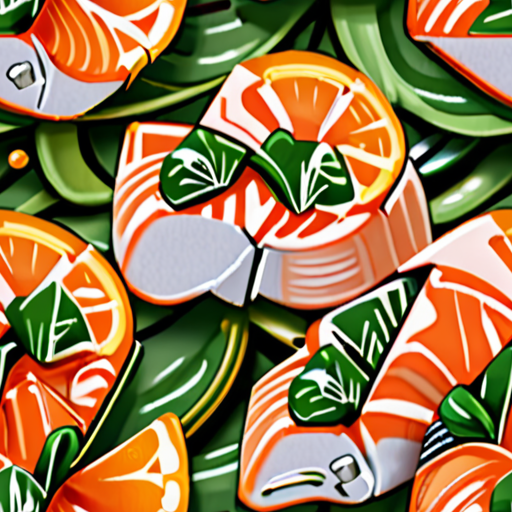
What Does Lemon Do to Salmon?
Lemon enhances the flavor and texture of salmon through several methods:
1. **Marinades and Dressings**: Lemon juice is commonly used as a marinade or dressing for salmon. It adds acidity, brightening the dish and enhancing the natural flavor of the fish. The acid in lemon juice can also help tenderize the salmon and prevent it from drying out during cooking.2. **Lemon Zest**: Lemon zest is often incorporated into salmon dishes for its aromatic properties. It adds a citrusy note and improves the overall taste without contributing significant moisture, as it is dry in nature.3. **Creamy Enhancements**: Lemon butter or lemon-infused oils are sometimes used to add a creamy texture and further layer of flavor to salmon dishes. These ingredients complement the fish by introducing richness without overwhelming it with acidity.4. **Grilling and Cooking Techniques**: When grilling or pan-searing salmon, a drizzle of lemon juice near the end of cooking can help maintain moisture and prevent the fish from drying out. This method also allows the natural sugars in the salmon to caramelize slightly, creating a delicious glaze effect.5. **Salad Preparations**: In salads featuring salmon, lemon juice is used as part of a vinaigrette or dressing. It provides tanginess and helps emulsify the dressing, creating a brighter and more refreshing flavor profile.6. **Nutritional Benefits**: Lemons are rich in vitamin C, which supports immune function. When paired with salmon’s omega-3 fatty acids, lemon juice may aid in the absorption of these nutrients, potentially offering health benefits.These uses demonstrate the versatility of lemon in transforming salmon into flavorful and nutritious dishes, whether in simple preparations or elaborate feasts.
Why Do Chefs Add Lemon to Fish?
Chefs often add lemon to fish dishes for several reasons, primarily to balance the natural briny flavor of the seafood. Fish, such as salmon, trout, and sea bass, tend to absorb minerals from the ocean water they reside in, giving them a slightly salty taste. This inherent flavor can sometimes overpower the dish, so lemon acts as a perfect counterpart.Lemon juice and zest are highly acidic, effectively cutting through the salinity of the fish and brightening the overall flavor profile. This creates a harmonious balance, making the dish taste fresher and more vibrant. Additionally, lemon complements many common fish seasonings, such as dill, basil, or thyme, enhancing the dish’s complexity.Beyond flavor enhancement, lemon may also contribute to the texture of the fish. Its slight acidity can help tenderize the flesh, ensuring a more succulent eating experience. Furthermore, lemon’s preservative properties may help maintain the fish’s freshness, especially when preparing dishes that will be served later or when grilling.In summary, chefs use lemon to counteract the natural saltiness of fish, elevate its flavor, and introduce a refreshing element that makes the dish more enjoyable. This technique ensures that the fish’s delicate taste shines through, creating a well-rounded and memorable meal.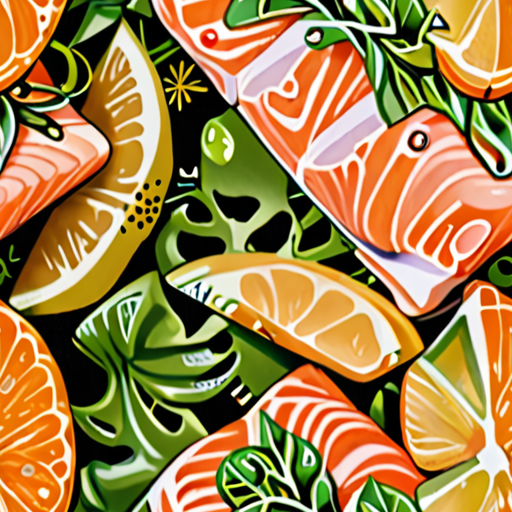
How to Enhance the Flavor of Salmon
To maximize the flavor of salmon, consider these expert tips:
Seasonings and Herbs
- Lemon and Dill: The classic combination of lemon and dill is a failsafe option. Fresh lemon juice brightens the fish, while dill adds freshness and complexity.
- Garlic and Olive Oil: A simple marinade made with minced garlic, olive oil, salt, and pepper can transform salmon into a flavorful dish.
- Butter: Drizzling butter over grilled salmon adds richness and creates a delicious sauce.
- Cilantro or Basil: These herbs can add a refreshing twist to your dish.
- Spice Mixes: Try a blend of cumin, paprika, and thyme for a deeper, more aromatic flavor.
- Honey or Maple Syrup: A drizzle of these sweeteners balances the savory notes of the salmon.
Cooking Methods
- Grilling: Grill over charcoal or wood for a smoky flavor.
- Baking: Bake in the oven with a lemon wedge and herbs for moisture.
- Pan-Searing: Create a crust in a skillet for a crispy texture.
Accompaniments and Sides
- Quinoa or Brown Rice: Season these grains to complement the dish.
- Aioli or Chimichurri Sauce: Add a creamy or spicy kick.
- Mango Salsa or Avocado Salad: Introduce freshness and fruitiness.
Key Tips
- Use High-Quality Ingredients: Fresh herbs, lemon, and citrus zest are crucial.
- Season the Fish: Salt and pepper are essential, and red pepper flakes can add heat.
- Consider Dietary Preferences: Offer alternatives like vegetable stir-fries or quinoa salads.
Conclusion
By combining thoughtful seasonings, cooking methods, and accompaniments, you can elevate your salmon dishes to new heights. Experiment with different flavors and techniques to find your personal favorite.

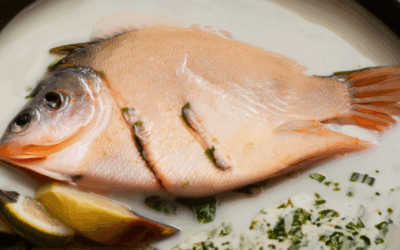

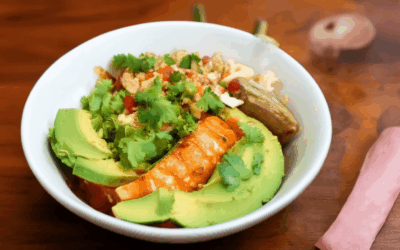
0 Comments